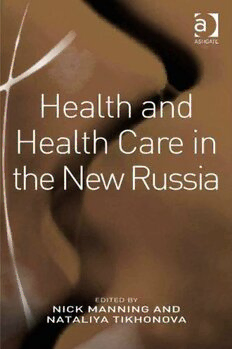
Health and Health Care in the New Russia PDF
333 Pages·2009·3.408 MB·English
Most books are stored in the elastic cloud where traffic is expensive. For this reason, we have a limit on daily download.
Preview Health and Health Care in the New Russia
Description:
This volume explores the nature of health and health-care experiences in Russia by comparing societies and communities with different socio-cultural conditions. Key questions addressed by the authors include: How do Russians understand health and what are the factors that influence this understanding? How does this influence Russian self-treatment and prevention behaviour? What are the effects of poverty and standards of living on health? And, how do Russians seek and get access to medical care?These themes were explored through the collection of original data from households in three Russian cities: Moscow, Voronezh and Kazan - the same households interviewed for the authors' earlier work on work and welfare, and poverty and social exclusion. Such a longitudinal follow-up of the same households over 10 years is a unique achievement. In addition questions were identified for inclusion in the 2005 Russian Longitudinal Monitoring Survey, conducted by University of North Carolina, Chapel Hill.This book is especially valuable for its collection of original data following a period of rapidly worsening health status amongst the Russian population and a grave decline in male life expectancy. The findings are set within the context of experience from Finland and the UK, allowing the authors to explore the challenge of the Russian health-care crisis to Western European models of health status and health care.
See more
The list of books you might like
Most books are stored in the elastic cloud where traffic is expensive. For this reason, we have a limit on daily download.
